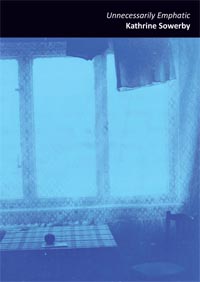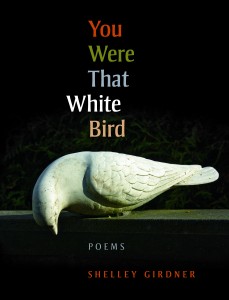Unnecessarily Emphatic by Kathrine Sowerby
– Reviewed by Elizabeth Rimmer –
Unnecessarily Emphatic was first published in August 2015 and reprinted in January 2016 by Red Ceilings Press, who produce e-books and limited edition chapbooks (very limited – only thirty-five copies of this one). They seem to specialise in the weirder outposts of poetry, and I am therefore delighted to see that this got a reprint, because it is a genuine find that I would never have come across except via Sabotage.
The blurb on the back is intimidating:
Here, the sleeper is a linguistics textbook, the dream its payload of example sentences: words which were meant to be looked at but never into.
and a first glance at the text no less so:
I was at your home.
I was with you.
I was with you.
You were with me.
You have an armchair.
You have a sofa.
You have a house.
The short sentences are like this all the way through: sparse, simple to the point of being banal, repetitious, apparently unconnected, and often contradictory. I was reminded of those exercises we do when we are learning a new language in order to demonstrate first person, second person, plurals, position of adjectives, tenses and so on. The cumulative effect is to make you wonder about the words we choose to learn first, and why? I am led to think about the words which are most important to us, the ideas we try hardest to express. Gradually stories of some sort begin to emerge: I build up a sense of continuity, and invest the fragmentary sentences with personality and meaning. People have arrived from somewhere, and settled into this house. There are relationships. Time passes. The relationships fail. The people have gone. Somehow even the lack of particularity creates a surprisingly emotional sense of the bleak fragility of life:
I feel ready to drop, I’m so
tired.
I’ve a lot of things to do.
There aren’t any armchairs
in the room.
or:
I’m convinced that she
knows the whole truth.
Don’t say that; you don’t
know all the truth.
He said it to all the crowd
gathered in the street.
He said that to everybody.
Language fails. We may talk, but does anyone hear, or understand, much less respond in the way we would like? Things change and decay and our words cannot explain or even record the changes properly. What is important to one person is unnoticed by another. We may observe, but we do not understand each other’s emotions. Connections do not last.
Beyond this, some words come up again and again, until I begin to wonder what does ‘inside’ mean? Is ‘in the house’ different from ‘in my opinion’? What are ‘things’? and if we know that, what is ‘anything’? or ‘nothing’? What is ‘the whole thing’? And, especially, what is ‘the whole truth’? What happens when time passes? And why when we name the woods, the sky and the behaviour of water are they so very potent in the imagination?
This is a poet’s poem – in the sense that the practice of poetry might make a reader more receptive to the games it plays – but I could see it work as a film poem or an installation too. I hope it can be made available to a wider public, because it truly deserves to be better known.




